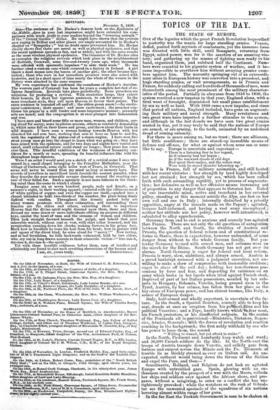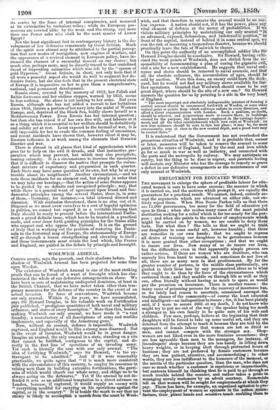TOPICS OF THE DAY.
THE STATE OF EUROPE.
ONE of the legacies which the great French Revolution bequeathed' to posterity was the mania for large standing armies. France, defied, poured forth myriads of combatants, yet the immense force- was directed with little skill, until Bonaparte, returning from
Egypt, seized power, won for it the sanction of an amazing vie..tory, and gathering up the masses of fighting men ready r'to hand, organized them' and subdued half the Continent. Nnnt.-- hers were essential to his gigantic system of warfare, and it be- came impossible to overthrow him without arraying greater num- hers against him. The necessity springing out of an extraordi- nary crisis in European history was converted into a precedent, and• huge standing armies, or vast arrangements, as in Prussia and France, for suddenly calling out hundreds of thousands of men, were thenceforth among the most prominent of the military character- istics of the period. Partially in abeyance from 1816 to 1830, the system received a new impetus in that year, England alone, with a fatal want of foresight, diminished her small peace establishment by sea as well as land. With 1848 came a new impulse, and since that period all nations, England included, have gone on augment- ing their military and naval strength. Many revolutions . and two great wars have imparted a further stimulus to the system; and although in the last decade we have seen two great armies wasted in war, yet it may truly be said that the nations of Europe are armed, or are arming, to the teeth, animated by an undefined dread of coining calamity.
For there is peace among us, but no trust; there are alliances, but little confidence ; there are stored-up incredible means of defence and offence, for what or against whom none can or none like to say. Europe is uncertain and expectant-
" There is a listening fear in her-regard,
As if calamity had but began ' - As if the vanward clouds of evil days Had spent their malice, and the sullen rear Were with its stored thunder labouring up."
There is France, full of military animation, and still heated: with her recent victories ; her strength by land highly developed' but not strained ; her strength by sea, -which has been called' forth with such astounding rapidity, yet in process of augmenta- tion; her defensive as well as her offensive means increasing out of proportion to any danger that appears to threaten her. Ruled- by one inscrutable mind, active and trenchant in her external' policy, standing at this moment astride the Alps, one foot on her own soil and one in Italy ; internally disturbed by a priestly opposition, angry at the inroads made on the Papacy ; agitated, because half-informed, and having a vast army unemployed ;- neither her attitude nor her policy, however well-intentioned, is calculated to allay apprehension. Germany from end to end is anxious- and scarcely less agitate& than France. There are not only the old questions of antagodislit between the North and South, the rivalries of Austria and' Prussia, the question of federal reform and of constitutional re- ' forms in States, there is expectation, however unfounded, of some- danger from without to the whole German family. But yes- terday Germany teemed with armed men, and columns were on the march for the Rhine. South Germany has not got over its alarms. North Germany is eager for federal and local reform. Prussia is wary, slow, ambitious, and always armed. Austria is a proud bankrupt menaced with a judgment execution, not un- willing to make a show of_ compromise with inexorable creditors ; eager to stave off the evil day ; holding her non-German pas-, sessions by force and fear, and depending for existence on an army which broke in her hands when tried against French steel.. Deprived of part of her Italian possessions, assailed by her sub-- Tyjects • in Hungary, Bohemia, Venetia, losing ground even in that Tyrol,. Austria, by her crimes, has fallen from her place as the key-stone of European peace, and has almost become, like Italy, a, source of European danger. Italy, half-armed and wholly expectant, is uncertain of the fu- ture. In the South, a Spanish Bourbon, scarcely able to keep his seat, dreads at once an eruption from his pollkicaltEtna and his. political Vesuvius ; and a Tope, hardly knows which1iear most, his French protectors, or his disaffected subjects. In the-centre of the Peninsula all is provisional—Ministries, Dictators, Regen- cies, Aimies, Generals ; with the.forces of revolution and reaction couching in the baekground4; the first nobly withheld by one who has power to loose them, the second
"Willing to wound, but yet afraid to strike."
In the North, Piedmont and Lombardy keep watch and ward; and 50,000 French soldiers do the like. In the. North-east the troops of Austria trample down Venetia, and sulkily gaze from.. fortress and outpost across the Mincio and the Po. 'Elements e£ trouble lie as thickly strewed as ever on Italian soil. An un, e ted outburst would bring down the throne of the Sicilia* and expel the Pope, and then— ? Scandinavia, Holland, and Belgium do not look on agitated.. Europe with untroubled gaze. Spain, glowing with an en• thnsiasm created by the prospect of a war with the Moors, celled& her ships and soldiers over against the African shore, and pre- pares, without a misgiving, to enter on a conflict she has un- righteously provoked ; while the watchers on the rock of Gibrale tar see the unwonted speetacle of the squadrons of six nations, hovering almost within range of her guns.
In the far East the Turkish Government is seen.to be shaken its centre by the force of internal conspiracies, and menaced at its extremities by turbulent tribes; while its European pos- sessions are coveted alike by the weak and the strong, and more than one Power asks who shall be the next master of Lower Egypt ? Not the least significant fact in contemporary history is the de- velopment of her defensive armaments by Great Britain. Much of the spirit now abroad may be attributed to the partial percep- tion that new modes of navigation, new engines of warfare, and the appearance of a revived element in European policy, have in- creased the chances of a successful descent on- our shores ; but much also, perhaps more, may be directly traced to that undefined dread of impending calamities which was felt by the "spouse of gold Hyperion." Great Britain, in short, not only feels that if all wore a peaceful aspect she would do well to augment her de- fensive forces, but she also feels that in the present electrical state of Europe it is imperative on her to give them a comprehensive, national, and permanent development.
.Russia alone, covered by the memory of 1812, her Polish and Baltic fortresses and her endless steppes, warned by 1855, seems to fear nothing. She alone is not looking to her arms. But even Russia, although she has not added a recruit to her battalions since 1856, throws a portion of her navy into the midst of Western Europe, and, deprived of the Black Sea, boldly shows herself as a Mediterranean Power. Even Russia has her internal question ; but then she has raised it of her own free will, and labours at it as a thing which it is essential to her welfare should be definitively and solidly set at rest. Least exposed to the turmoil of war, it is still impossible for her to evade the common feeling of uneasiness, and recent incidents have shown that, however silent it may be, Russian influence is at work among the elements that threaten disorder and war.
There is abroad in all places that kind of apprehension which goes far to help on the evil it dreads, and that instinctive pre-
paration which may prevent, but which may also precipitate, coming calamity. It is a circumstance to increase the uneasiness that it is difficult to discover the motive that prompts the redun- dant mixture of expectancy and preparation in each quarter. Each State may have some question of its own, but why be at any trouble about its neighbours? Another circumstance,—and we note these incidents for no alarmist end, but simply in order that we may take our bearings,—that the action of some States appears to be guided by no definite and recognized principle ; nay, that while there is a general want of agreement upon broad and fun- damental principles among the several States, there is, in some of them,—Germany, for instance,—a total internal discord and disunion. With confusion threatened, there is no clue out of it. Disposed as we must avow ourselves to a sort of hopeful optimism in politics, we cannot but regard it as a veritable blessing that Italy should be ready issue, present before the international Parlia- ment a grand definite ssue which has to be treated in a practical mode, and must draw forth guiding principles for the States alike who support and who oppose the Italians. It is on the ground of Italy that in working out the problem of restoring the Penin- sula to the historical map of Europe, the statesmanship of Europe will go through a lesson strengthening and elevating to itself ; and those Governments must retain the lead which, like France and England, are guided in the debate by principle and foresight.



























 Previous page
Previous page